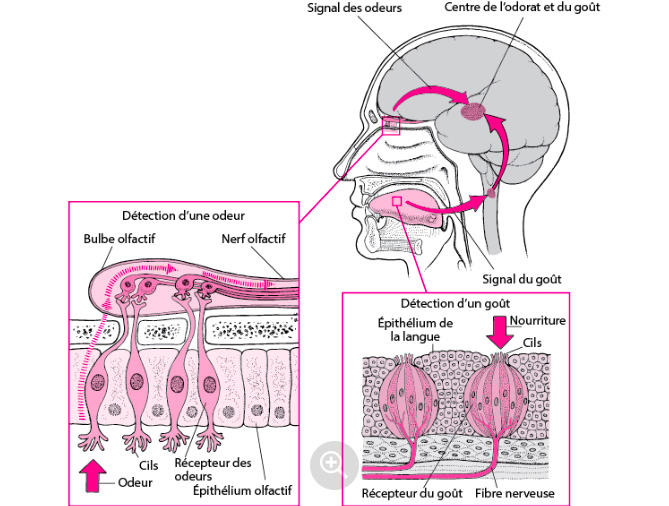What is the link between taste and smell? How do these two senses work and complement each other?
If taste is a sense to which we pay a lot of attention, this is clearly not the case for smell. Having become the main indicator of a Covid infection when we are deprived of it, anosmia has suddenly made us realize the importance of the sense of smell in our daily lives and the handicap it represents when it has disappeared.
However, taste and smell are two senses physiologically very linked.
Demonstration:
Taste is what makes food so pleasant ; but there is an important distinction between taste and flavor. Thus, analyzing the complex relationship between taste and smell requires more accurate language.
Your sense of smell is responsible for most of the perceived flavor of a food.
Odor can influence your perception of flavor in one of two ways: as a constituent part of that flavor, or as a modulating force. In the first case, an odor is part of the flavor itself. And in the second, an odor modifies or adjusts your perception of a flavor.
Thus, the sense of smell being linked to the nose and taste with the mouth, these two senses work in the following way: the receptors transmit a signal to the brain with nerves, which meet in what we call “the center of smell and taste”
So, smell has an impact on the perception of a flavor because direct olfaction (through the nostrils) communicates to the brain what it should expect from the food, thus modifying the perceived flavor of the latter.
An example of this is that wine lovers put their nose in the glass before taking the first sip. If this serves to identify any imperfections in the wine, it also amplifies the taste before it reaches the mouth thanks to the aromas that are transmitted to the brain.

It is only after this stage, when the imagination has been well stimulated, that the first sip reveals all its gustatory potential. This phenomenon of “retro-olfaction” is also used by some great chefs, who for the experience, have approached perfumers to create works as unique as rare.
This is the case of Thierry Mugler with Fauchon or Pierre Gagnaire, who created a dish inspired by the perfume “Terre d’Hermès”. Also, Chef Olivier Rollinger and Jean-Claude Ellena worked together on this occasion to study the retro-olfaction process.
You can support scientific research related to perfume and the sense of smell, which is crucial for the future of perfumery, by making a donation to the Per Fumum Endowment Fund. Find all the answers to your questions on the website www.fondsperfumum.org or contact us on jesuisdonateur@perfumum.org.